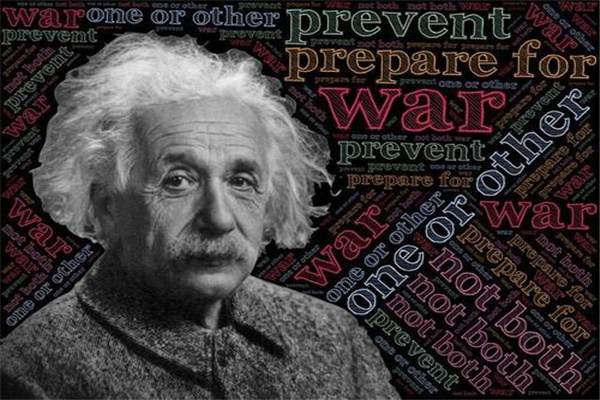一、爱因斯坦简介 爱因斯坦个人简介
1、爱因斯坦全名叫阿尔伯特·爱因斯坦(Albert Einstein,1879年3月14日—1955年4月18日),出生于德国符腾堡王国乌尔姆市,毕业于苏黎世联邦理工学院,犹太裔物理学家
2、爱因斯坦于1879年出生于德国乌尔姆市的一个犹太人家庭(父母均为犹太人),1900年毕业于苏黎世联邦理工学院,入瑞士国籍。1905年,获苏黎世大学哲学博士学位,爱因斯坦提出光子假设,成功解释了光电效应,因此获得1921年诺贝尔物理奖,1905年创立狭义相对论。1915年创立广义相对论。1955年4月18日去世,享年76岁。
3、爱因斯坦为核能开发奠定了理论基础,开创了现代科学技术新纪元,被公认为是继伽利略、牛顿以来最伟大的物理学家。1999年12月26日,爱因斯坦被美国《时代周刊》评选为“世纪伟人”。
二、爱因斯坦的英文名,
爱因斯坦英文全名:Albert Einstein
要求将这两个词拆开、组合成一个可以形容爱因斯坦本人的词汇.
单词、词组、句子都可以.
三、爱因斯坦的全名叫什么?
中文名: 阿尔伯特·爱因斯坦
外文名: Albert Einstein
国籍: 美国、瑞士双重国籍
民族: 犹太族
出生地: 德国乌尔姆市
出生日期: 公元1879年3月14日(己卯年)
逝世日期: 公元1955年4月18日(乙未年)
职业: 思想家、哲学家、科学家
毕业院校: 苏黎世联邦理工学院、苏黎世大学
主要成就: 提出相对论、质能方程式
解释光电效应
推动量子力学的发展
代表作品: 《论动体的电动力学》、《广义相对论基础》
荣誉: 1921年(辛酉年)诺贝尔物理学奖
著名公式: E=mc^2
血型: O
四、爱因斯坦的英文名怎么拼写?
爱因斯坦 Einstein (全名Albert Einstein)
爱因斯坦,美籍德国犹太裔,理论物理学家,相对论的创立者,现代物理学奠基人。1921年获诺贝尔物理学奖,1999年被美国《时代周刊》评选为“世纪伟人”。
中文名: 阿尔伯特·爱因斯坦
外文名: Albert Einstein
国籍: 美国、瑞士双重国籍
民族: 犹太族
出生地: 德国乌尔姆市
出生日期: 公元1879年3月14日
逝世日期: 公元1955年4月18日
职业: 物理学家、思想家、哲学家
毕业院校: 苏黎世联邦理工学院、苏黎世大学
主要成就: 提出相对论及质能方程
解释光电效应
推动量子力学的发展
代表作品: 《论动体的电动力学》、《广义相对论基础》
荣誉: 1921诺贝尔物理学奖
著名公式: E=mc^2
五、爱因斯坦的英文全名
基本信息栏
中文名: 阿尔伯特·爱因斯坦
外文名: Albert Einstein
国籍: 美国,瑞士
民族: 犹太族
出生地: 德国乌尔姆市
出生日期: 1879年3月14日
逝世日期: 1955年4月18日
职业: 物理学家,哲学家
毕业院校: 苏黎世联邦理工学院
主要成就: 提出相对论及质能方程
解释光电效应
推动量子力学的发展
代表作品: 《论动体的电动力学》,《广义相对论的基础》
Albert Einstein 1921爱因斯坦是德裔美国物理学家(拥有瑞士国籍),思想家及哲学家,犹太人,现代物理学的开创者和奠基人,相对论——“质能关系”的提出者,“决定论量子力学诠释”的捍卫者(振动的粒子)——不掷骰子的上帝。 1999年12月26日,爱因斯坦被美国《时代周刊》评选为“世纪伟人”。
爱因斯坦1900年毕业于苏黎世联邦理工学院,并入瑞士国籍。1905年获苏黎世大学哲学博士学位。曾在伯尔尼专利局任职。苏黎世工业大学、布拉格德意志大学教授。1913年返德国,任柏林威廉皇帝物理研究所所长和柏林洪堡大学教授,并当选为普鲁士科学院院士。1933年因受纳粹政权迫害,迁居美国,任普林斯顿高级研究所教授,从事理论物理研究,1940年入美国国籍。有一句熟悉的格言是“任何事都是相对的。”但爱因斯坦的理论可不是这一哲学式陈词滥调的重复,它是一种精确的用数学表述的方法。此方法中,科学的度量是相对的。显而易见,对于时间和空间的主观感受依赖于观测者本身。
在爱因斯坦小的时候,有一天德皇军队通过慕尼黑的市街,好奇的人们都涌向窗前喝彩助兴,小孩子们则为士兵发亮的头盔和整齐的脚步而向往,但爱因斯坦却恐惧得躲了起来,他既瞧不起又害怕这些“打仗的妖怪”,并要求他的母亲把他带到自己永远也不会变成这种妖怪的国土去。中学时,母亲满足了爱因斯坦的请求,把他带到意大利。爱因斯坦放弃了德国国籍,可他并不申请加入意大利国籍,他要做一个不要任何依附的世界公民……大战过后,爱因斯坦试图在现实的基础上建立他的世界和平的梦想,并且在“敌国”里作了一连串“和平”演说。他的思想和行动,使他险遭杀身之祸:一个抱有帝国主义野心的俄国贵族女刺客把枪口偷偷对准了他;德国右翼刺客们的黑名单上也出现了阿尔伯特·爱因斯坦的名字;希特勒悬赏两万马克要他的人头。为了使自己与这个世界保持“和谐”,爱因斯坦不得不从意大利迁到荷兰,又从荷兰迁居美国,而且加入了美国国籍。他认为,在美国这个国度里,各阶级的人们都能在勉强过得去的友谊中共存下去。 (节选自《应用写作》学术月刊1985年第5-6期《爱因斯坦的反省》)
十九世纪末期是物理学的大变革时期,爱因斯坦从实验事实出发,重新考查了物理学的基本概念,在理论上作出了根本性的突破。他的一些成就大大推动了天文学的发展。他的量子理论对天体物理学、特别是理论天体物理学都有很大的影响。理论天体物理学的第一个成熟的方面——恒星大气理论,就是在量子理论和辐射理论的基础上建立起来的。爱因斯坦的狭义相对论成功地揭示了能量与质量之间的关系,坚守着“上帝不掷骰子”的量子论诠释(微粒子振动与平动的矢量和)的决定论阵地,解决了长期存在的恒星能源来源的难题。近年来发现越来越多的高能物理现象,狭义相对论已成为解释这种现象的一种最基本的理论工具。其广义相对论也解决了一个天文学上多年的不解之谜,并推断出后来被验证了的光线弯曲现象,还成为后来许多天文概念的理论基础。
2009年10月4日,诺贝尔基金会评选“1921年物理学奖得主爱因斯坦”为诺贝尔奖百余年历史上最受尊崇的3位获奖者之一。(其他两位是1964年和平奖得主马丁路德金、1979年和平奖得主德兰修女。)
六、求爱因斯坦的英文简介
全名是Albert Einstein(阿尔伯特·爱因斯坦)
Albert Einstein is undoubtedly one of the most fascinating and influential figures of the modern era. As a preeminent physicist, he radically transformed our understanding of the universe. As an ardent humanist, he took an active and outspoken stance on the significant political and social issues of his time. As a committed Jew, he advocated a distinctive moral role for the Jewish people.
Albert Einstein's contribution to modern physics is simply unique. His scientific career was a constant quest for the universal and immutable laws, which govern the physical world. His theories spanned the fundamental questions of nature, from the very large to the very small, from the cosmos to sub-atomic particles. He overturned the established concepts of time and space, energy and matter. Einstein played a crucial role in establishing the two pillars of 20th century physics: he was the father of the theory of relativity and a major contributor to quantum theory.
Einstein was a theoretical physicist - his only concrete tools being pencil and paper. It has been said that his true tools were a penetrating and intuitive grasp of the workings of the natural world and the "thought experiment" - an intellectual exercise used by physicists to reach a theoretical conclusion from idealized physical processes. Yet, Einstein was not a purely abstract thinker. He grasped the world in concrete images and strove to translate them into words and equations that could be understood by others.
Science was Albert Einstein's first love, yet he always found time to devote tireless efforts to political causes close to his heart. His ardent humanism led him to strive for peace, freedom and social justice. The young Einstein found the authoritarianism and militarism of the German educational system profoundly disturbing. The virulent nationalism and brutality of the First World War served to confirm Einstein's pacifist and internationalist convictions.
In the 1920s, Einstein became an active leader of the international anti-war movement and supported conscientious objection. However, the Nazi rise to power brought about a substantial change in Einstein's position: he began to advocate military preparedness by the European democracies against the threat of Nazism. In this context, Einstein wrote his famous letter to U.S. President Roosevelt in which he urged him to initiate an American nuclear research programme. With the onset of the atomic era, Einstein realized that nuclear weapons were a profound risk to humanity and could bring an end to civilization. During the last decade of his life, he was tireless in his efforts to create effective international cooperation to prevent war.
Throughout his life, Albert Einstein felt a close affinity with the Jewish people. Einstein defined Judaism as a culture with a shared historical past and common ethical values rather than as an institutionalized religion. For him the main values of Judaism were intellectual aspiration and the pursuit of social justice. Like Spinoza, he did not believe in a personal god, but that the divine reveals itself in the physical world. Einstein supported the creation of a homeland for the Jews in Palestine. However, he stipulated that any solution of the Arab-Jewish conflict had to be based on mutual understanding and consent.
Albert Einstein was one of the founders of the Hebrew University of Jerusalem. He served on the University's first Board of Governors and Academic Council. He delivered the University's inaugural scientific lecture and edited its first collection of scientific papers. His unique relationship to this institution found a lasting expression in the bequest of his literary estate and personal papers to the Hebrew University in his Last Will and Testament.







